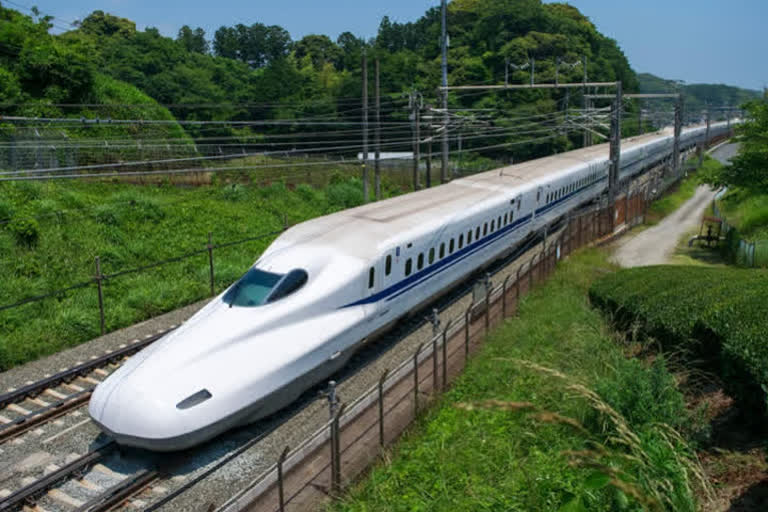Hyderabad: Though Bullet trains are currently operational in about 20 countries across the globe, including Japan, China, and Britain, in India, which has grown to become the fifth-largest economy in the world, the high-speed train is still unheard of. Although the foundation for the first bullet train project in the country was laid three years ago, it has not even been able to overcome problems such as land-acquisition.
In addition, the Centre has come up with another seven new projects. The corridor connecting Mumbai, the financial capital of the country, with Hyderabad, is one of them. While it is gratifying to think of initiating new projects, it is a worrying fact that no progress has been made in the ambitious project.
Japan, the ideal example
Japan was the first country in the world to have launched the bullet train. High-speed train services began in the year 1964 itself, connecting the cities Tokyo and Osaka. The bullet train system is one of the main reasons why Japan has emerged as the third-largest economy after the United States and China.
In spite of Japan's economy plummetting with the onset of World War II, since then, the government and the people have together worked to bring development back on track. Japan embarked on a bullet train project aimed at achieving inclusive growth in the country. This revolutionized the country's business sector and the state of the nation's economy.
Read: Bullet train project may miss 2023 deadline, land acquisition still under process, says Railways
Industries have been able to make efficient use of human resources as travel time has decreased, increasing their time of productivity. The tourism sector also started booming accordingly. Thus, the economy started thriving in Japan.
Having an almost nil-death rate due to train accidents along with an average annual delay of just 20 seconds is by itself a testament to the robustness and the efficiency brought in by the high-speed bullet train system in a country like Japan.
The Modi government had initiated the construction of a 508-kilometre-long bullet train line between Mumbai and Ahmedabad with the help of Japan. In 2017, Prime Minister Modi co-founded the project with the then-Japanese Prime Minister Shinzo Abe. The estimated cost of the project was Rs 1.08 lakh crore, of which 81 per cent was borrowed from Japan. The goal was to make the first bullet train operational by December 2023.
With India turning 75 in 2022, the Centre hopes to launch bullet train services in August the same year.
Farmers Need to be Reassured
The bullet train travels at a speed of 320 kilometres per hour. The National High Speed Rail Corporation (NHSRC) claims that the travel time from Ahmedabad to Mumbai will come down to just three hours. However, even after a lapse of three years from the date of the laying of the foundation stone for the track, there has been no major progress made in the project.
Read: Will the Farm Bills actually benefit the farmers?
1,380 hectares of land is required for the construction of the corridor - around 940 hectares in Gujarat, 431 hectares in Maharashtra and the remaining land in Dadra and Nagar Haveli. Of this, only 63 per cent of the total land has been acquired so far.
The above indicates that the Centre and the NHSRCL are planning to postpone the target deadline to 2028. With the delay, the cost of the project will also increase. In fact, Maharashtra Chief Minister Uddhav Thackeray recently made an open statement that the project was not on their priority list.
Thackeray is neglecting the Mumbai-Ahmedabad project because he thinks Prime Minister Modi is too ambitious of the same. If a CM of a state is talking about a prestigious project in such a way, how can farmers be expected to come forward to part with their agricultural land for the sake of national development?
Once they part with their fertile lands, farmers fear that they could lose their livelihood. Hence, the Centre and the states must instil confidence in them and ensure that such steps are being taken for their future. The benefits that accrue to the country due to the inception of the bullet train system must be explained to them.
Further, better rehabilitation facilities should be provided to the farmers, and they should be provided rates a few times higher than the market rate for their fertile lands. Steps should also be taken to build new houses for the homeless and to allocate land elsewhere in exchange for the land taken from them. The governments should come forward to give them jobs if necessary. Only if all the above are ensured, will the country take a real step towards realising the bullet train dream.



